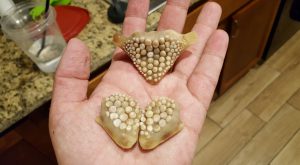While walking along a beach in Pensacola, Florida, a beachcomber found a strange, toothy object that looked fossilized. The mysterious find stumped marine biologists and museum experts for nearly two decades.
The answer? It wasn’t a fossil—it was a set of pharyngeal teeth from a freshwater drum fish. Unlike most fish with sharp teeth in their mouths, freshwater drums have flat, molar-like teeth in their throats to crush hard-shelled prey like clams and snails. These teeth often resemble coral or mosaics, making them easily mistaken for ancient relics.
Though freshwater drums typically live in lakes and rivers, they can survive in brackish water. It’s likely this specimen was carried to shore by tides or ocean currents.

The find highlights one of nature’s more fascinating adaptations and serves as a reminder: not everything strange on the beach is ancient—some of it just shows how clever evolution can be.